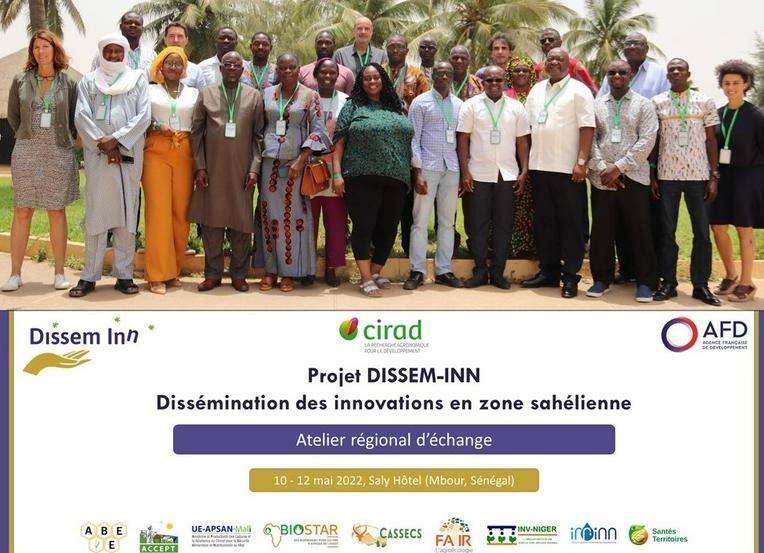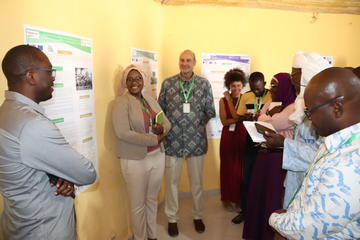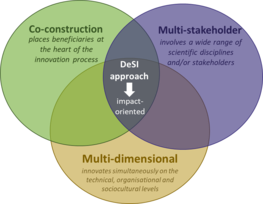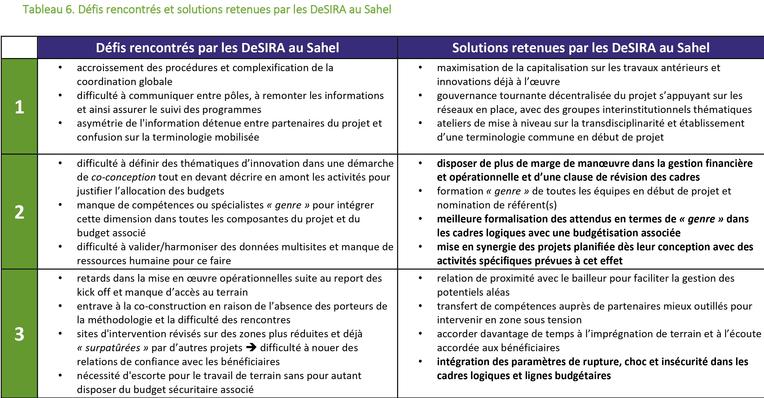Regional workshop on sharing methods
Last update: 28 March 2024
Scoping
This first activity brought together the representatives (leaders and focal points) of the nine projects involved in DISSEM-INN to enable them to exchange on their first research results and the strategies envisaged to implement and promote the innovations produced for their dissemination and adoption. Its main objective was to better understand the meaning given by these projects to the notion of "development smart innovation", through three dimensions :
- as a concept in support of the project's operation (envisaged approach, theoretical framework)
- as a field approach (methodologies implemented)
- as outcomes (technical, organisational, institutional)
This workshop was the starting point for the co-design of a cross-cutting analysis on innovation processes, which will be translated into several synthesis documents and policy briefs.
This workshop pursued the achievement of the first expected outcome of the DISSEM-INN project, i.e. to ensure "the participants in the DeSIRA projects concerned will have shared knowledge of the approaches, outcomes and lessons of the other DeSIRA projects, enabling them to reflect on their own approaches".
Process
This first event on the DISSEM-INN timeline brought together the nine DeSIRA projects involved, and was held at the Saly Hotel in Mbour (Senegal) from 10 to 12 May 2022.
The workshop opening session was a "DeSIRA Fair", during which the project members found out about each other's activities through an exhibition of nine standardised posters produced by DISSEM-INN (see photo below).
Several group work sessions (days 1 and 2) were held, each one beginning with the presentation of a cross-cutting analysis carried out prior to the workshop by the DISSEM-INN team in order to provide the participants with a synthesis of their respective contributions to these three themes and a framework on the points of convergence and divergence.
The final day was used to launch a reflection on the DISSEM-INN project's specific communication strategy, with a presentation of the tools implemented to foster internal and external information sharing within the DeSIRAs in the Sahel community and the signature of a protocol to frame this dissemination. The event ended with a plenary discussion on the follow-up to be given to the DISSEM-INN project in the light of the future events planned on its timeline.
→ To find out more about the process, see the associated news.
Key outputs
The complete outputs of the workshop can be found in the three resulting publications: a briefing note, a policy brief and the final report. Two other outputs were also produced, including a cross-cutting mapping of the dissemination and scaling strategies envisaged by these nine projects, which can be found on the “Outputs” page. The main conclusions and recommendations to be drawn from these publications are summarised below.
1. Characterisation of the DeSI approach
This first DISSEM-INN regional exchange workshop helped to gain an understanding of what the “DeSI” notion actually means, in other words to characterise the DeSI approach according to three principles shared by all of the DeSIRA projects concerned, namely:
- Co-construction: the beneficiaries targeted are at the heart of the innovation process to facilitate the adaptation and adoption of innovations.
- Multi-stakeholder: a wide range of scientific disciplines and partners are involved, all working to support local stakeholders.
- Multi-dimensional: the projects do not innovate only on the technical level, but also on the organisational and sociocultural levels (see analytical framework of innovations below).
By following this “DeSI” innovation process, in other words by combining these three key principles, the DeSIRA projects pursue an impact-oriented approach aimed at ensuring the sustainability of the changes induced.
2. Recommendations of the DeSIRA projects faced with the challenges encountered
The DeSIRA projects are facing changes in their operational context due to:
- endogenous factors: the growth and increasing complexity of projects;
- exogenous factors: increasing unpredictability and crisis situations.
The implementation of the DeSI approach thus presents a certain number of challenges that are shared by all of the DeSIRA projects concerned, and can be grouped under three main headings: organisational complexity (1), scientific complexity (2), and unpredictability of context (3). The DeSIRA projects propose a certain number of solutions to address these challenges, which are summarised in the table below :
French version only
Last update: 28 March 2024




